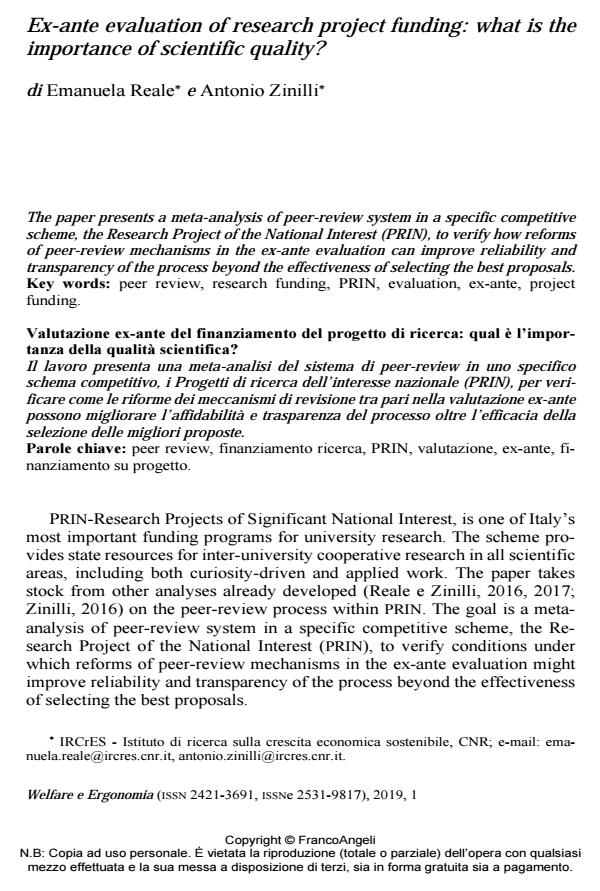Ex-ante evaluation of research project funding: what is the importance of scientific quality?
Titolo Rivista WELFARE E ERGONOMIA
Autori/Curatori Emanuela Reale, Antonio Zinilli
Anno di pubblicazione 2020 Fascicolo 2019/1 Lingua Inglese
Numero pagine 13 P. 29-41 Dimensione file 194 KB
DOI 10.3280/WE2019-001004
Il DOI è il codice a barre della proprietà intellettuale: per saperne di più
clicca qui
Qui sotto puoi vedere in anteprima la prima pagina di questo articolo.
Se questo articolo ti interessa, lo puoi acquistare (e scaricare in formato pdf) seguendo le facili indicazioni per acquistare il download credit. Acquista Download Credits per scaricare questo Articolo in formato PDF

FrancoAngeli è membro della Publishers International Linking Association, Inc (PILA)associazione indipendente e non profit per facilitare (attraverso i servizi tecnologici implementati da CrossRef.org) l’accesso degli studiosi ai contenuti digitali nelle pubblicazioni professionali e scientifiche
The paper presents a meta-analysis of peer-review system in a specific competitive scheme, the Research Project of the National Interest (PRIN), to verify how re-forms of peer-review mechanisms in the ex-ante evaluation can improve reliability and transparency of the process beyond the effectiveness of selecting the best proposals.
Il lavoro presenta una meta-analisi del sistema di peer-review in uno specifico schema competitivo, i Progetti di ricerca dell’interesse nazionale (PRIN), per veri-ficare come le riforme dei meccanismi di revisione tra pari nella valutazione ex-ante possono migliorare l’affidabilità e trasparenza del processo oltre l’efficacia della selezione delle migliori proposte.
Keywords:Peer review, finanziamento ricerca, PRIN, valutazione, ex-ante, finanziamento su progetto.
- Arensbergen P. and van Besselaar P. (2012). The selection of scientific talent in the allocation of research grant. Higher Education Policy, 25: 381-405.
- Hornbostel S. (2001). Third party funding of German universities: an indicator of research activity? Scientometrics, 50. DOI: 10.1023/A:1010566916697
- Lamont M. (2009). How professors think. Inside the curious world of academic judgment. Cambridge: Harvard University Press.
- Langfeldt L. (2001). Decision-Making constraints and processes of grant peer review, and their effects on the review outcome. Social studies of Science, 31: 820-841. DOI: 10.1177/030631201031006002.
- Langfeldt L. (2006). The policy challenges of peer review: managing bias, conflict of interests and interdisciplinary assessments. Research Evaluation, 15(1). DOI: 10.3152/147154406781776039
- Laudel G. (2006a). The ‘quality myth’: Promoting and hindering conditions for acquiring research funds. Higher Education, 52: 375-403.
- Laudel G. (2006b). The art of getting funded: how scientists adapt to their funding conditions. Science and Public Policy, 33: 489-504. DOI: 10.3152/147154306781778777
- Reale E. e Zinilli A. (2016). La valutazione dei Programmi di ricerca di Interesse Nazionale PRIN: quali criteri usa la comunità scientifica? RIV-Rassegna Italiana di Valutazione, 64: XX.
- Reale E. and Zinilli A. (2017). Evaluation for the allocation of university research project funding: can rules improve the peer review? Research Evaluation, 26(3): 190-198.
- Zinilli A. (2016). Competitive Project Funding and Dynamic Complex Networks: Evidence from Projects of National Interest (PRIN). Scientometrics, 108: 633-52.
Emanuela Reale, Antonio Zinilli, Ex-ante evaluation of research project funding: what is the importance of scientific quality? in "WELFARE E ERGONOMIA" 1/2019, pp 29-41, DOI: 10.3280/WE2019-001004